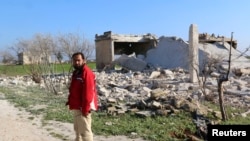Syrian government forces captured an important village in the northwestern province of Idlib on Sunday, drawing close to a major town in the last rebel stronghold in the country, state media and opposition activists said.
The capture of Habeet opens up an approach to southern regions of Idlib, which is home to some 3 million people, many of them displaced by fighting in other parts of the country. Habeet is also close to the town of Khan Sheikhoun, which has been held by rebels since 2012, and to parts of the highway linking the capital, Damascus, with the northern city of Aleppo, Syria's largest.
Syrian troops have been trying to secure the M5 highway, which has been closed since 2012. Idlib is a stronghold for al-Qaida-linked militants and other armed groups.
Syrian troops have been attacking Idlib and a stretch of land around it since April 30. The three-month campaign of airstrikes and shelling has killed more than 2,000 people on both sides and displaced some 400,000.
The government-controlled Syrian Central Military Media said the Syrian army captured the village after fierce fighting with al-Qaida-linked militants.
The Britain-based Syrian Observatory for Human Rights, an opposition-linked war monitor, described the capture of Habeet as ``the most important advance'' by government forces since April 30. It said the overnight fighting left 18 insurgents and nine pro-government gunmen dead.
Syrian troops have been pushing their way into Idlib and rebel-held northern parts of Hama province in recent weeks under the cover of intense airstrikes and shelling.
In Damascus, meanwhile, Syrian President Bashar Assad attended Eid al-Adha prayers in a mosque.
State news agency SANA showed Assad attending the Muslim prayers early Sunday at Afram Mosque along with top officials, including the prime minister and the country's grand mufti.
Over the past few years, Assad's forces have been able to capture most areas controlled by rebels in other parts of the country, including the eastern suburbs of Damascus.
Eid al-Adha, or the Feast of the Sacrifice, marks the willingness of the Prophet Ibrahim (Abraham to Christians and Jews) to sacrifice his son.

